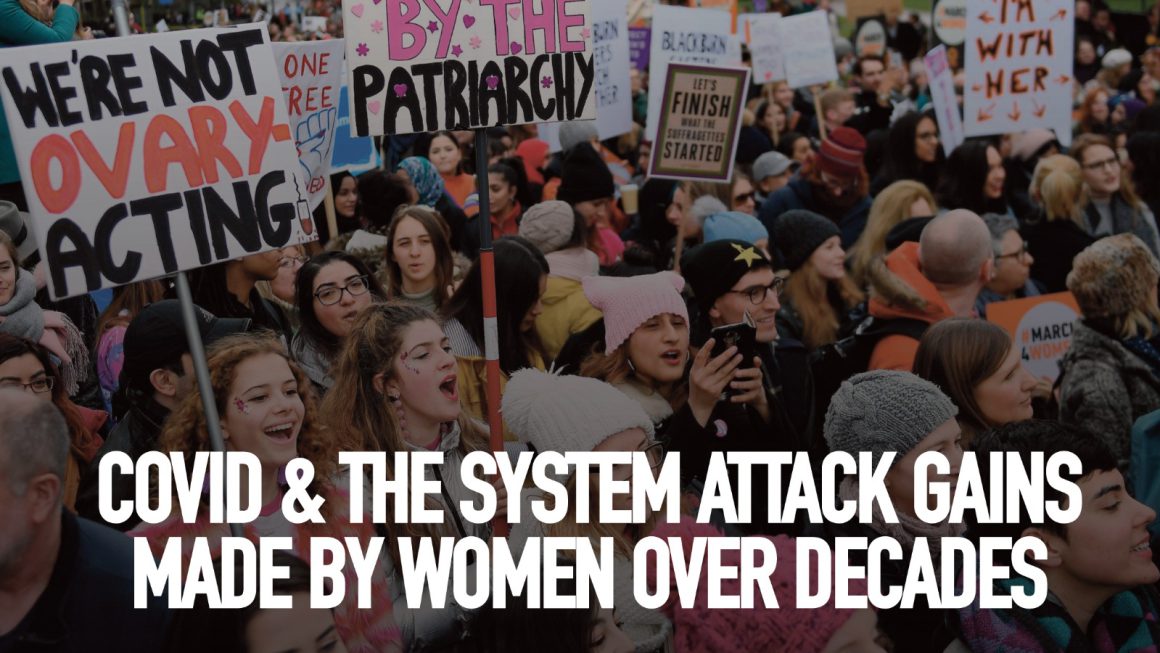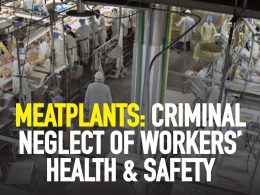By Katia Hancke
The Covid crisis is creating unprecedented hardship for working class people all over the world – economically, socially, in terms of physical and mental health and in a multitude of other ways. But working class women are at risk of losing the most of all – decades of hard won gains in the fight against women’s oppression are at risk of being wiped out by this crisis.
The impact of Covid-19
Women workers have borne the brunt of job losses as it is the sectors with predominantly female workers that have been hardest hit – retail and hospitality to name just two. Globally, research shows that women’s jobs are 1.8 times more at risk than men. The figures of women, especially young women, living in poverty are shooting up.
Women are also disproportionately asked to risk their health as frontline workers – care giving sectors such as nursing, childcare, teaching etc are overwhelmingly female. The Government sent nurses into the fray with PPE gear that was standard designed for a male physique – a small example of how deeply ingrained sexism is in capitalist society, that it even is found in mundane details of everyday working life.
With the increase in working from home, the repeated closure of schools and childcare, the hours of unpaid labour in the home have shot up. Research in the UK shows that homeschooling alone added an average of five hours of work per day for women, compared to two hours per day for men. For single parents (again, overwhelmingly women) the situation is even worse. Anyone who has ever been on a zoom call with a mother of (pre) school aged children will relate to what those figures mean in real life – people (women) desperately trying to juggle two, three or even four tasks at the same time. No wonder then that stress and mental health are reaching crisis point.
Women workers
Debenhams workers first highlighted how companies are let off the hook in mistreating their employees when they close up shop. Arcadia workers (again, overwhelmingly a female workforce) are now joining that fight for a just settlement. Frontline workers found out that the best they can expect from this government is a round of applause – when it comes to actual appreciation for the huge sacrifices health workers and other essential workers have made over the last year, this government has been in hiding.
No solutions for childcare, no measures to ease the burden on the health service through investment, recruitment and better pay and conditions. Bosses are happy enough to have workers work from home but offer no support to facilitate that transition – more profit for them, more stress for their employees.
Gender violence: a shadow pandemic
The most extreme crisis facing women is the shadow pandemic of gender violence spiralling out of control. On 22 February, Safe Ireland published a report that the situation had deteriorated significantly in the last few months of 2020 compared to the first lock down. Between September and December 2020 800 women (and their children) were turned away from shelters with nowhere to go. Nearly 70 women per day now reach out to services for help. Bear in mind, those figures precede the current (and longest) lockdown.
All anecdotal evidence points to things getting even worse – in February the media covered 24 stories of extreme examples of gender violence every week. While there is no shortage of coverage of horrific violence committed against women, what is increasingly absent is a highlighting of the fact that this is a crisis. What is needed is a coordinated response that highlights the issue, provides funding or services, increased capacity in shelters and crucially affordable housing as well as long term support for survivors. While gender violence affects all women, the pressing need for even the most basic supports (such as shelter when someone flees a violent situation!) means that this government is most of all letting down working class women, who need those services most.
Build a socialist feminist movement
International Women’s Day 2021 takes place after one year of this pandemic. Covid has graphically illustrated the systemic injustices and oppression women face under capitalism. In the coming year we must resolve to build a multi-gendered, multi-racial working class, socialist feminist movement that will end the rule of this system.
When enough is enough: The case for socialist feminism
By Katia Hancke
The last few years we have seen the growing radicalisation and mobilisation of a new generation of women right across the world. International Women’s Day protests on all continents became just one expression of a global movement mobilising hundreds of thousands of working-class women against gender violence, for bodily autonomy and challenging oppression in all its forms. This is not just another “single issue” movement, it is a movement that increasingly puts the whole capitalist system in the dock as oppressive and backward.
Oppression and exploitation
No wonder that there is a direct connection between the development of this worldwide movement and the movements against oppressive regimes and exploitation that are developing in many countries. From Belarus to Thailand, in struggles right across Latin America, young women have been once again to the forefront.
The terrible consequences of the pandemic are affecting working class women in a multitude of ways. But events over the last year show that women have not forgotten an important lesson- if we organise, we can win. A new generation of women was no longer prepared to accept the status quo, leave alone they are now prepared to settle for further setbacks! In the harsh conditions of the first year of the pandemic, we have still seen that mood reflected in a new wave of #MeToo struggles from China to the Balkans to France, in powerful mass struggles for bodily autonomy such as the victory for abortion rights in Argentina.
Growing radicalisation
This same radicalisation is evident in Ireland – a new generation of women is standing up against all expressions of oppression. Just think of the outrage at the Image Based Sexual Violence scandal, the protests against the attempted cover up of the Mother and Baby Home records. Gender violence has been firmly placed on the agenda as a pandemic that needs to be taken seriously.
All forms of oppression are being exposed and fought against – just look at the huge participation of youth in the Black Lives Matter movement. In the economic struggles, all working class people will have to wage in the next period to defend tens of thousands of jobs, as well as pay and conditions. The way has been led by the courageous Debenhams workers who for more than 300 days now are staunchly demanding a just redundancy settlement. Working class women are leading the way in struggles on many fronts.
For socialist change
In that context, socialist feminist ideas are more relevant than ever. As socialist feminists, we understand that all these different issues are intertwined in one especially important way – they are inevitable under the capitalist system. From economically exploiting workers to leaning on conservative institutions to impose the status quo to creating a culture that idealises and promotes violence, it is those at the very top of society (and their political lackeys) who benefit, even profit from keeping things as they are. For the rest of us, this system has outlived its usefulness – and gives us nothing but environmental catastrophe, health crises, economic hardship and a society that relies on oppression and exploitation.
We fight against all expressions of oppression and exploitation and aim to bring together working class people of all genders, colour, and backgrounds to create a united movement that ends the rule of our common enemy—the system of capitalism. We have a common interest to fight for a democratic, socialist society based on the democratic, collective ownership and control over the planet’s wealth resources. Such a society would utilise the enormous achievements in science and technology to end and eradicate poverty and deprivation. The rule of the working class would have human solidarity as its cornerstone and in turn do away with the plethora of oppressions and injustices that capitalism has harnessed and fostered.












